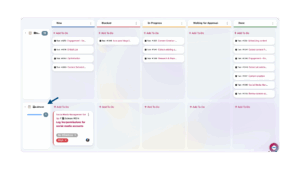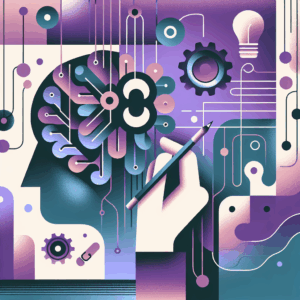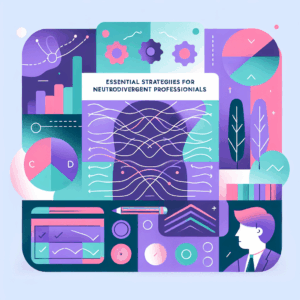Navigating daily responsibilities can be challenging and reasons for this can vary across time constraints, competing priorities, mental and emotional fatigue, and even external distractions. These constrains benefit from strategies that enhance productivity as a way to help individuals regain a sense of control over the work being done.
In this guide, we will explore practical task management techniques tailored to address specific needs, offering insights on prioritization, goal setting, and organizational tools.
Whether you’re a student, a professional, or seeking to boost daily productivity, we hope that this resource will help equip you with the knowledge and skills necessary to better understand your relationship with productivity so you can more easily see the results of your effort and to feel good about the work you do.
Table of contents
The Challenges of Task Management in Today’s World of Productivity
Because ADHD and other neurodivergent brains are unique in the way they process information, it means that we are unique in other ways too – like in what we need to be productive. What neurodivergent minds need to be productive, however, is regularly at odds in a society built for other types of processing. The juxtaposition this creates results in challenges in managing tasks, organizing work, staying focused, and even identifying priorities.
Let’s normalize this difference, though, by looking at an example in nature. When asked to think of a bee, the honeybee is often the first to come up. Honeybees are a type of social bee, living in hives, with a hierarchy and group work style. And yet… of the over 20,400 species of bees worldwide, over 90% of bees are nothing like honeybees. They are solitary, working differently and living differently.
In fact, in India, there are roughly 700 species of bees. Only 5 species are social bees. Now, let’s say the way we manage tasks and work has been built for the social bee model only. Naturally, the 695 remaining species of solitary bees find it challenging to collect pollen in a system built for only the 5.
Unfortunately for humans, we do not think of brains or our differences like we do of different bee species. Nor do we view the ways we’re productive under the same lens. Instead, a deficit model is applied — creating significant consequences to a large group’s executive functions – even when the system benefits from the work of the solitary bee (and neurodivergent).
Regardless of your brain type (or bee species), executive function can become more manageable through proven strategies, the right support, and in a way that life can feel productive and meaningful. This requires, however, a better understanding of exactly what is needed in order to support the neurodivergent mind. As this paper continues, we will discuss the challenges and ways to better support the executive function and neurodivergent needs.
Defining Successful Task Management with ADHD
There are several well known strategies for helping those with ADHD understand the status and progress of their task through the use of visual organizational tools such as tangible planners, digital organizational tools and even Kanban boards. By visually laying out tasks, deadlines, and priorities, individuals can create a clear and structured overview of their responsibilities, making it easier to track progress and stay on top of important tasks.
This visual approach not only helps in organizing thoughts but also serves as a reminder of pending tasks, reducing the chances of forgetting or overlooking important deadlines.
Personalized task management techniques tailored to suit individual preferences and strengths can play a crucial role in enhancing productivity.These personalized approaches can include breaking down tasks into smaller, more manageable steps, setting realistic goals, and establishing a structured routine that aligns with their unique strengths and weaknesses.
By customizing task management strategies to fit specific needs, individuals with ADHD can better navigate through their daily responsibilities and improve their overall efficiency. This also supports creating alignment across the strategies with a definition of task success.
In addition to utilizing visual tools and personalized techniques, regularly evaluating the effectiveness of chosen methods is essential for individuals with ADHD. This ongoing assessment allows for adjustments to be made based on what works best for each individual, enabling them to fine-tune their strategies and optimize their productivity levels.
This is also important for identifying and seeing progress as you complete work and better understand what works for you in your organization. Visualizing and understanding progress helps to boost dopamine and can keep you engaged with your work. Be sure to stay open to making changes but don’t get pulled away to changes in the chase of new dopamine.
Many individuals may adapt many systems because getting organized can be more satisfying than regularly using the methods. By finding the right balance to modifying their approaches, individuals with ADHD can continuously refine their task management skills and adapt to changing circumstances.
Furthermore, incorporating mindfulness techniques into daily routines can significantly benefit individuals with ADHD in managing tasks more effectively. Mindfulness practices, such as meditation and deep breathing exercises, can help individuals stay present, reduce impulsivity and procrastination, and enhance their overall focus and cognitive control.
By cultivating mindfulness, individuals with ADHD can develop a greater sense of awareness and self-regulation, which are essential for maintaining concentration and making informed decisions when managing tasks.
Detailed planning and organizational strategies are also crucial for individuals with ADHD to stay on track, prioritize tasks efficiently, and adjust their approaches based on productivity levels and external distractions. Implementing structured planning methods, such as creating daily to-do lists, setting reminders, and establishing clear timelines for tasks, individuals can better manage their time and resources, leading to improved task completion rates and reduced feelings of overwhelm.
Mastering task management is a continuous journey for individuals with ADHD, but by leveraging effective strategies such as visual organization tools, personalized techniques, mindfulness practices, and detailed planning methods, they can overcome common challenges, boost their productivity, and ultimately lead more fulfilling lives.
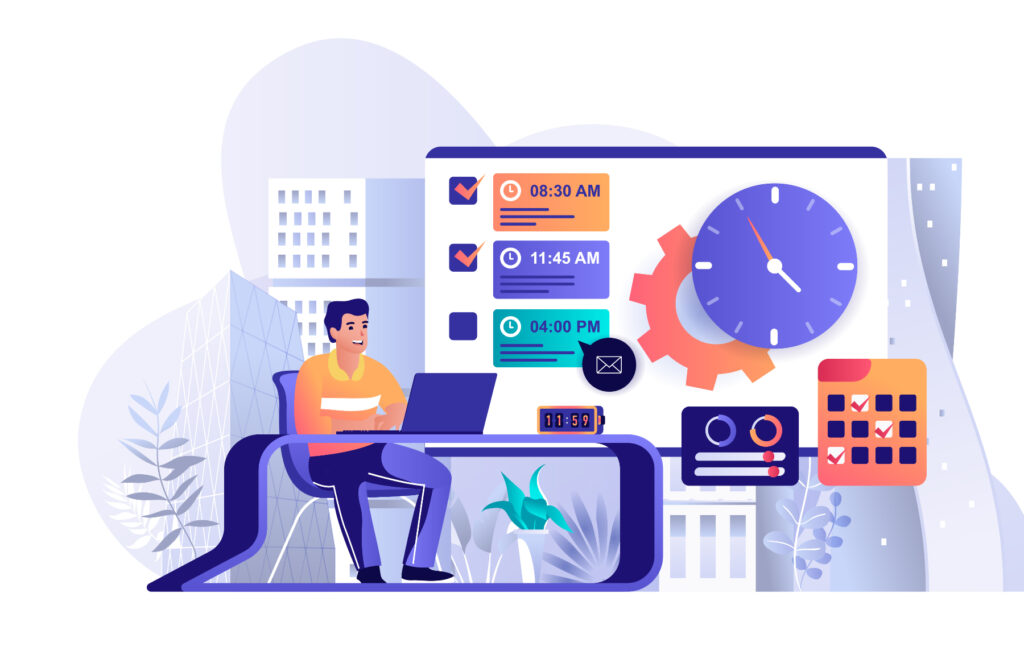
A More In-Depth Look At Effective Techniques for Task Management
Effective task management is crucial for maintaining productivity and reducing stress. By implementing proven techniques, individuals can enhance their organizational skills and accomplish more in less time.
Schedule and Planner
Crafting a well-organized schedule or daily planner is the first step towards efficient task management. Allocate specific time slots for each task, ensuring that you have a clear roadmap for the day ahead. This structured approach helps in prioritizing tasks and allocating time wisely.
Reminders and Alarms
Utilizing reminders and alarms can serve as valuable prompts for transitioning between tasks. Setting up notifications for upcoming deadlines or task switches can help you stay on track and avoid procrastination.
Pomodoro Technique
One popular method that individuals can employ is the Pomodoro Technique. This technique involves breaking work into intervals, typically 25 minutes long, separated by short breaks. By focusing intensely for a set period and then taking a brief rest, individuals can maintain high productivity levels and prevent burnout.
Paper and Digital Planners
It’s important to avoid relying on mental to-do lists, as they can lead to overwhelm and forgetfulness. Instead, jot down tasks on paper or a digital platform to free up mental space and ensure nothing slips through the cracks. Mental to-do lists can also inhibit the ability to see progress – which, as mentioned, is important in boosting dopamine and motivation to continue on.
Related Blog: The Best ADHD Digital Planners
Prioritizing Tasks
Prioritizing tasks based on urgency and importance is key to effective task management. Identify high-priority tasks that require immediate attention and tackle them first. Breaking down complex tasks into smaller, manageable segments can also make them less daunting and easier to approach.
Practice Mindfulness
In addition to task-specific strategies, maintaining overall well-being is essential for sustained focus and productivity. Practicing mindfulness to help clear mental clutter and enhance concentration. Similarly, taking care of your physical health through regular exercise, proper nutrition, and sufficient sleep can provide the energy needed to tackle tasks effectively.
Incorporating these effective techniques into your task management routine, you can streamline your workflow, boost productivity, and achieve better work-life balance. Remember, mastering task management is a continuous process that requires dedication and practice, but the rewards in terms of enhanced efficiency and reduced stress are well worth the effort.
Overcoming Task Management Hurdles
Task management is a crucial aspect of both personal and professional life. However, many individuals face hurdles when it comes to effectively managing their tasks. In this blog section, we will explore various strategies and mindsets that can help in overcoming these obstacles and enhancing overall productivity.
Breaking Tasks into Smaller Steps for Improved Productivity
One common issue that individuals encounter is feeling overwhelmed by the sheer size or complexity of a task. To address this, breaking tasks into smaller, more manageable steps can make the overall process seem less daunting. By focusing on one step at a time, individuals can maintain a sense of progress and accomplishment, ultimately leading to improved productivity.
Making Tasks Engaging to Maintain Interest
Another challenge in task management is maintaining interest and motivation, especially for tasks that may seem repetitive or mundane. By finding ways to make tasks more engaging or enjoyable, individuals can sustain their focus and energy throughout the task. This could involve incorporating elements of gamification, setting personal rewards, or simply changing the environment in which the task is performed.
Dopamine Menu
One way to gamify tasks through a reward system is called a Dopamine Menu. You may have heard of folks offering or rewarding themselves with dessert after exercising while on a diet or an extra piece of chocolate if they take a walk. A dopamine menu is a similar concept where you create a reward list for hard activities. Ideally, you make this list before you need it and you add multiple items that you love to select from. This could look like extra video game time, a sweet treat, an activity you love, and more.
You can keep this list near you and as a task gets harder and you need motivation to complete it, you can pick an item and plan to do that activity as you finish your task. The important thing to do, however, is to do this before you need the list. If you wait until you need it, you likely won’t have the capacity to build out the list to use it.
The Role of Delegation in Task Efficiency
Delegation is a powerful tool that can significantly impact task efficiency. Often, individuals may hesitate to delegate tasks due to a fear of losing control or a belief that they are the only ones capable of completing the task.
However, delegating tasks can free up time and mental energy, allowing individuals to focus on higher-priority responsibilities. By trusting others with tasks and fostering a collaborative environment, overall efficiency can be greatly enhanced.
Considering a Growth Mindset Towards Task Completion
Finally, adopting a growth mindset can help reframe the way individuals approach task completion. Instead of viewing tasks as fixed challenges that are hard to overcome, a growth mindset sees tasks as opportunities for learning and development.
Here at Leantime, we also look at tasks as a collection of work that lead to outcomes. Outcomes being part of what helps us reach our goals. When we can connect the work to our outcomes and to the goal, we’re better able to see incremental progress and support the dopamine we need to drive motivation.
By implementing these strategies and mindsets, individuals can effectively overcome task management hurdles and achieve greater productivity and fulfillment in their personal and professional endeavors.
Related Blog: It’s Not Procrastination: Maybe The Work Isn’t Inspiring
Empowering Individuals with ADHD
Empowering individuals with ADHD requires a holistic and multifaceted approach that combines self-awareness, effective task management strategies, and self-care practices. It is essential for individuals with ADHD to develop a deep understanding of their unique strengths and challenges to effectively navigate daily tasks and responsibilities.
Because productivity is a full human experience and intersects with all aspects of our lives, it’s important to remember it in context to a bigger picture and not as one isolated thing. The following are some additional considerations.
Productivity Evaluation
Regularly evaluating productivity levels is another crucial step in the journey of self-empowerment for individuals with ADHD. By tracking their productivity, individuals can identify patterns, determine peak performance hours, and make necessary adjustments to optimize their workflow. This self-assessment process can provide valuable insights into areas that may require additional support or modifications.
Task Prioritization
Prioritizing tasks based on importance and deadlines is a fundamental skill for individuals with ADHD to stay organized and focused. Individuals can effectively allocate their time and energy to meet deadlines and achieve goals by creating a system to categorize tasks according to urgency and significance.
Breaking down complex tasks into smaller, more manageable steps can help prevent feelings of overwhelm and increase the likelihood of task completion.
Combating Procrastination
Procrastination is a common challenge for individuals with ADHD, making it imperative to develop strategies to combat this tendency. Setting specific deadlines, using Pomodoro technique, using Implementation Intentions, creating structured routines, and establishing accountability mechanisms (like body doubling) can help individuals overcome procrastination tendencies and maintain momentum in their tasks.
Organizational Tools
Maintaining a master list of tasks and creating daily to-do lists are essential organizational tools for individuals with ADHD. These lists can serve as visual reminders of pending tasks, deadlines, and priorities, helping individuals stay on track and focused. Delegating tasks when possible can also be beneficial in reducing workload and preventing burnout.
Utilizing Digital Tools
Tools like Google Calendar can be invaluable resources for individuals with ADHD to schedule tasks, set reminders, and manage appointments efficiently. By utilizing digital tools and apps, individuals can streamline their workflow, reduce cognitive load, and enhance productivity.
Leantime is a work management tool built specifically for neurodivergent individuals and uses a proprietary motivation model, understanding the research behind what motivates the brain and how those pieces work together to make it easier to get things done.
Built by a neurodivergent team, we also get it from a place of lived experience. It’s tools like this that can help us reframe our work in a world often set up for a different type of productivity.
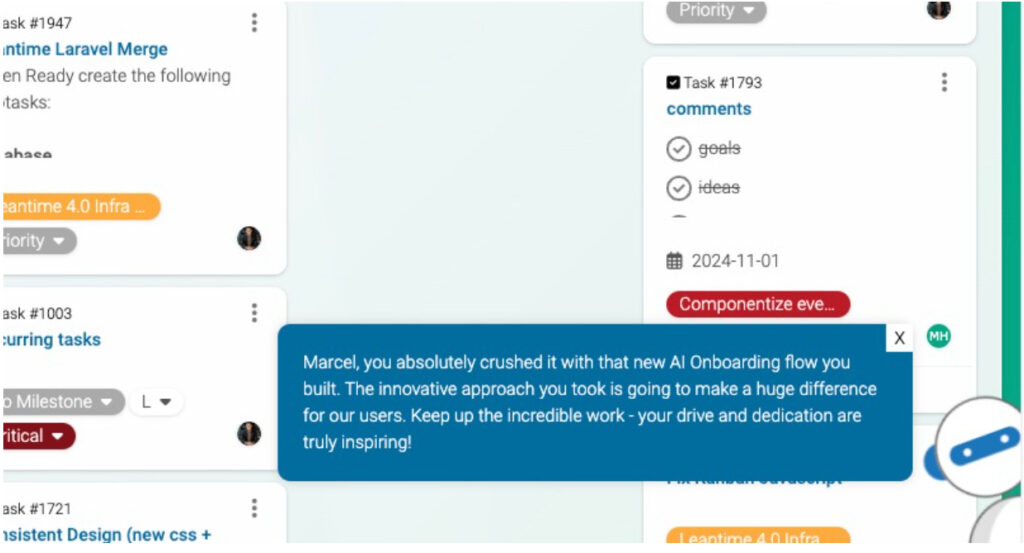
Time Management
Investing time in good prep work, planning ahead, and scheduling tasks backwards from deadlines can improve time management and task completion rates for individuals with ADHD. By creating a clear timeline of tasks and allocating sufficient time for each step, individuals can approach their responsibilities in a structured and organized manner.
Self-Care Practices
Taking care of both physical and mental health is paramount for individuals with ADHD to maintain focus, energy, and emotional well-being. Engaging in regular exercise, getting an adequate amount of sleep, and practicing stress-reducing activities can significantly impact cognitive function, mood regulation, and overall task management skills.
Conclusion
Implementing effective task management techniques can significantly improve the productivity and organization of individuals with ADHD. By utilizing strategies such as breaking tasks into smaller steps, setting realistic goals, utilizing tools like planners and reminders, and practicing mindfulness, individuals with ADHD can better manage their tasks, reduce feelings of overwhelm, and achieve greater success in various aspects of their lives.
Consistency and patience are key in mastering these techniques, but the rewards of implementing these practices into a daily routine can lead to an improved focus, effective time management, and overall well-being make the effort worthwhile. By taking control of their tasks and schedules, individuals with ADHD can unlock their full potential and thrive in their personal and professional endeavors.



